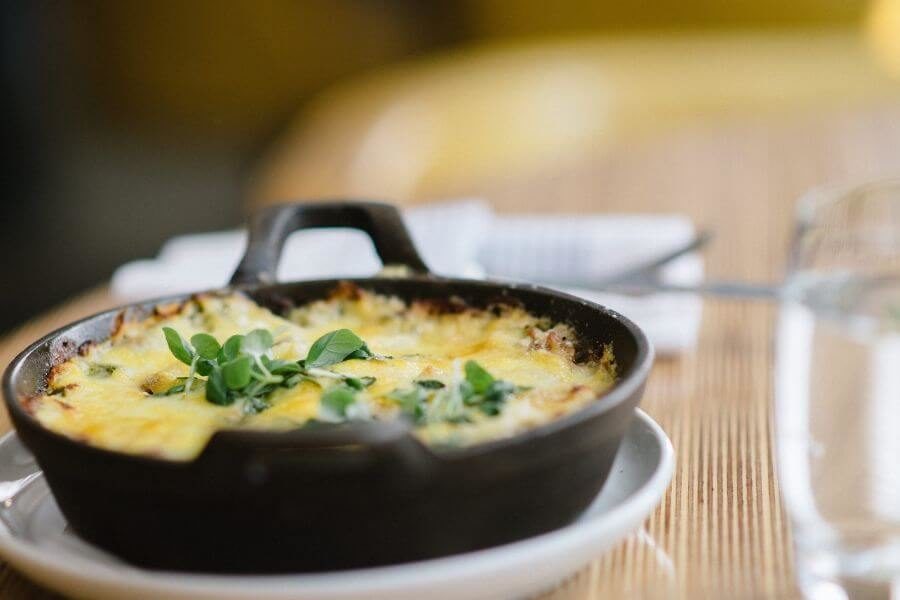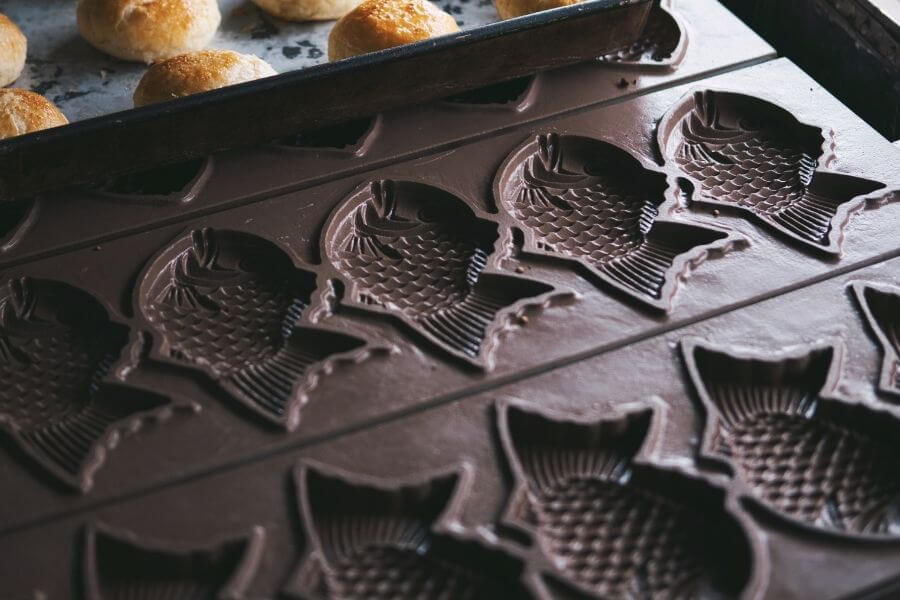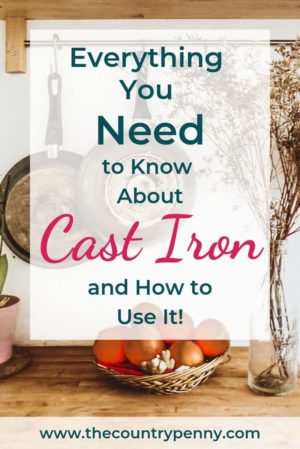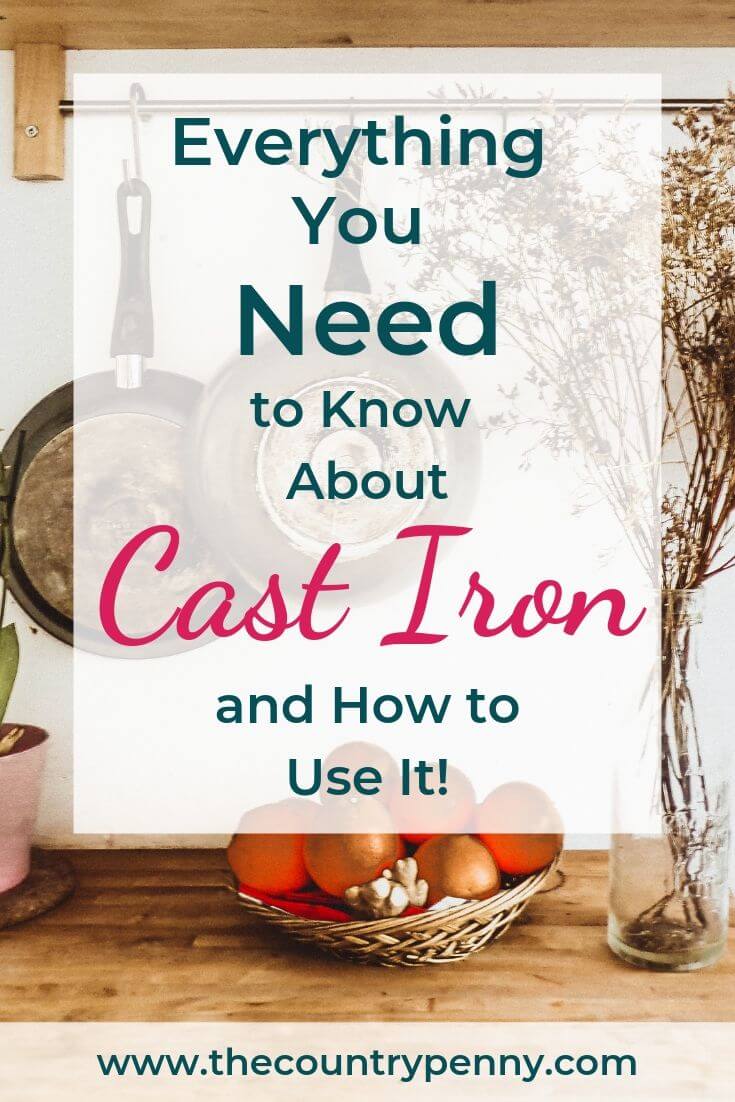Don’t have time to read it now? Pin it for later!
If you’re a cast iron fanatic (Hi Dad!), you’re probably going to want to stop reading right now. Cast iron is one of those topics that always gets a bit heated.
There’s a lot of misinformation out there about how to take care of it, what you can and can’t cook in it, if you should use dish soap, or are metal spatulas ok?
This is my real-world experience, tips and tricks for cooking in cast iron that I’ve learned over the last decade or so of using cast iron pans almost every single day. Everything from how to season it, to how to cook, and how to clean it. Along the way we’re going to talk about some common cast iron myths and my somewhat controversial opinions.
Seasoning your cast iron
Seasoning your cast iron only needs to be done when you first get it and then every few years as needed to maintain it. It sounds like an intimidating process, but seasoning is actually pretty easy.
Wash it out with dish soap and hot water and rinse it really well. If it has rusted, you will need to scrub off all the rust with steel wool. Wipe it dry then put it in a warm oven or on a warm stove to finish drying. It’s really important that you get it completely dry so don’t skip this step!
Once the pan is completely dry, you’re going to wipe it down with a thin coat of oil inside and out. There’s a lot of debate about the best oil to use for seasoning cast iron. I’ve used vegetable oil, olive oil, lard, and shortening. I’ve honestly not noticed much of a difference. I usually just use whatever I have nearby.
Whatever oil you use, the most important thing is to make sure that you only apply a thin coat! If you try to season it with a thick coating of oil it will make a sticky gunky mess. Been there done that, spent hours scrubbing it off so that I could redo it.
Once you have your thin coat of oil on the pan place it upside down in a 400° oven for an hour or so. Make sure to open a window because it will most likely smoke. Also make sure you put a sheet of tinfoil down underneath to catch the oil that will drip off.
If you are seasoning your pan for the first time or it was in really bad shape you can coat it with another thin coat of oil and repeat the baking process 3 or 4 times or until you achieve a finish you’re happy with. If you’re simply maintaining a pan that’s in decent shape you will probably only need to season it once.

Cooking with cast iron
I love cooking on cast iron. It’s so much better for you than Teflon coated pans and it’s super durable. Plus, I just like the way food turns out on cast iron better. A steak cooked in a good cast iron pan will rival anything cooked on the barbeque.
However, there’s a little bit of a learning curve with cast iron cooking. There are a few simple tips that will make a huge difference when you’re cooking with cast iron.
First, make sure your pan has been seasoned. When you season cast iron the oil forms a polymerized nonstick coating that is much easier to cook on.
Second, preheat your pan. Honestly, a hot pan is important for pretty much any cooking, but it is essential for cast iron. A hot pan will instantly sear your foods, helping to prevent sticking.
Third, use oil to cook with. You’ll find that there’s a bit of a theme with cast iron and oil. If you add a little bit of oil to the pan before you start cooking you’ll be amazed at how much less stickage there is.
One thing that I’ve heard many times is that you shouldn’t cook high acid foods like tomatoes in cast iron. It’s true, sort of.
I wouldn’t cook down a batch of spaghetti sauce for eight or ten hours in my dutch oven. But I also wouldn’t hesitate to heat up spaghetti sauce for dinner in my dutch oven.
For me, the determining factor is time. If it’s going to be many hours of cooking, I could see high acid foods being a problem, but I’ve never had an issue, even up to two or three hours of cooking time. If you’re extremely sensitive to metallic flavors, you might want to be more careful, but I’ve honestly never noticed any sort of off flavors.
Another common cast iron myth is that if you use metal utensils to cook in cast iron it will completely destroy the seasoning. This one is absolutely not true.
Take it from someone who has used and, honestly, abused her cast iron, a metal whisk or a spatula is not going to ruin your cast iron seasoning. The seasoning is really tough. Like I said earlier, it’s literally bonded to the metal and it doesn’t just flake off easily. A metal whisk is just not likely to damage it.

Cleaning Cast Iron
Ahh, the never-ending battle on how to care for cast iron.
Never use dish soap! Always use dish soap! Don’t use any sort of scrubbing pad! Scrub it out with salt! Use dish soap and a scrubbing pad!
Really, everybody’s got an opinion, and everybody is sure that they’re right. I refuse to have a battle in the comments section over how to clean cast iron, but here’s how I do it.
- Wash it while it’s hot.
I’ve heard horror stories of people running cold water in their hot cast iron and having it split right down the middle. That said, I’ve been washing my hot pans in cool water for years and I’ve never had an issue. Washing hot cast iron (I do it before we even eat!) is so sooo much easier than trying to scrub stuck on food out of cold cast iron. Everything just wipes right out.
- What about dish soap?
I don’t usually use dish soap for my cast iron. I don’t actually believe that it will take off the seasoning, since it’s polymerized and bonded to the metal. I just was raised in a family where using dish soap on cast iron was like spitting in church. You just don’t do it!
- Dry it
Don’t forget to dry it thoroughly! I dry it with a towel and then put it back on the warm burner or back in a warm oven. This way I can make sure that it is completely dry. Water is the number one enemy of cast iron. Never put it away damp or it will rust.
- Wipe it down with oil
A light coating of oil will help to protect your cast iron from rust while you aren’t using it. Since the oil prevents the humidity in the air from coming in contact with your pans it keeps them from rusting. Also, cast iron will develop its own seasoning over time and coating it with oil after each use helps with this process as well.
I usually just wipe the oil on the inside of the pan so that my cupboards stay clean. Once again, make sure it is a light coating of oil! Don’t soak it, there’s no benefit from using more oil and it will just make a mess.
I promise, cast iron cooking is so much simpler to use and take care of than you might think. It really is something that has been overcomplicated and made to sound much more difficult than it actually is.
When it comes down to it, a cast iron pan is a solid piece of metal. There’s really not much that you can do to ruin it. So don’t be afraid to start using your cast iron! All mistakes are fixable, and once you get to know your cast iron I’m sure you’ll love it as much as I do.





